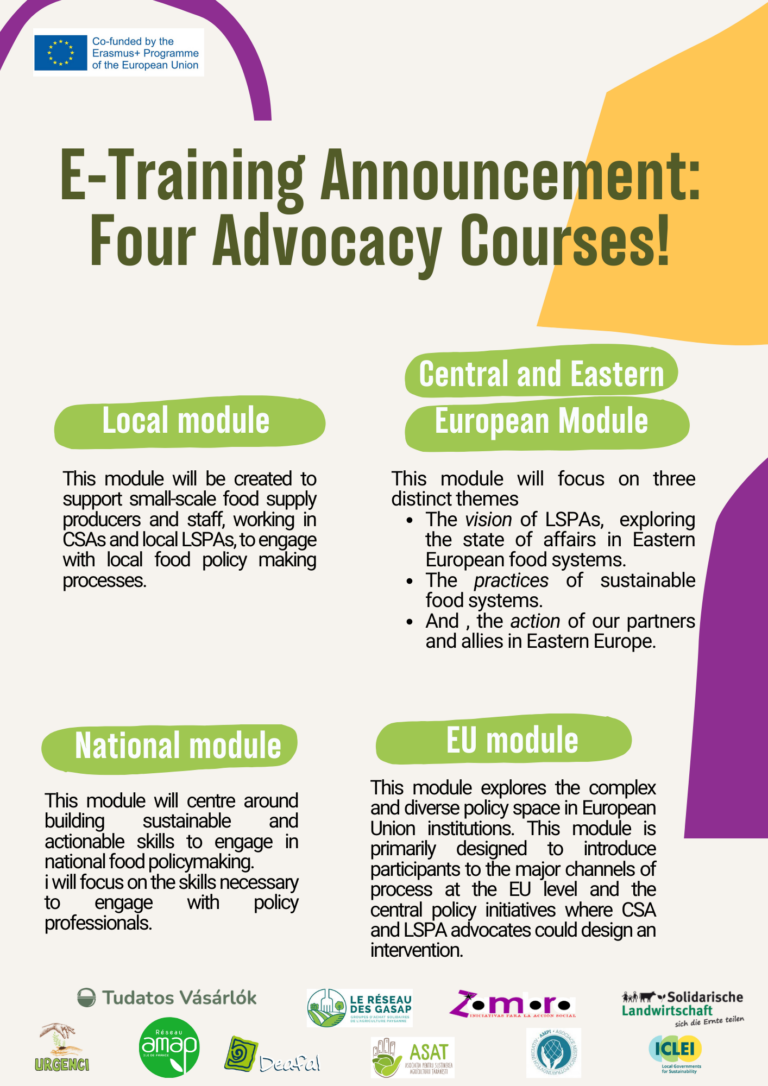E-Training Announcement: Four Advocacy Courses this May!
Announcing the SALSIFI Training Program
To close out our celebration of #CSAWeek, we are excited to announce a series of e-training courses. This May, URGENCI, in partnership with AMPI, Deafal, ASAT, Gasap, TVE, SoLaWi and many others, will hold training designed to build our allies’ capacity to implement CSA and LSPA (Local Solidarity-based Partnerships for Agroecology) principles and practices in food policy.
The SALSIFI Project (Supporting Advanced Learning for Stakeholders Involved in sustainable Food systems Initiatives) aims to develop and implement an innovative transnational education programme. This programme will be designed to strengthen the capacity of CSA networks and civil servants at local, regional, national and EU levels to engage in collaborative public food policy-making processes. SALSIFI will upskill staff in non-formal education to foster knowledge sharing and build knowledge to engage in those collaborative institutional processes.
Ultimately, this programme will be delivered on URGENCI’s learning platform via four distinct e-training modules, scheduled to run in May 2023.
Local Module
The first module will be created to support small-scale food supply producers and staff, working in CSAs and local LSPAs, to engage with local food policy-making processes.
In this course, learners can expect to engage with professionals from local authorities and advocates working persistently for change inside the local food policy spaces. In addition to our project partners, participants in this course will hear from experts at ICLEI (Local Governments for Sustainability).
Ultimately, after taking this e-training, participants in this module will be able to build unity between different CSA and LSPA initiatives to strengthen their capacity to engage with public authorities, improve their soft skills to engage in advocacy, and build and design advocacy initiatives designed to transform local food policymaking.
Here you can find an example of a local initiative that involved the municipality of Trento in Italy.
Central and Eastern European Module
The Central and Eastern European e-training module focuses on three distinct themes relevant to this regional context in Europe. First, the vision of local solidarity-based partnerships for agroecology. This section explores the state of affairs in Eastern European food systems. Second, the practices of sustainable food systems. This component will investigate current processes of advocacy and intervention, using case studies and stories from our grassroots partners. And finally, third, the action of our partners and allies in Eastern Europe. This final section will help participants gain inspiration and knowledge so that future advocacy campaigns can be designed.
Participants in this course can expect to learn how to define sustainable food systems, like CSA; understand how greenwashing plays a role in production and consumption; learn basic soft skills, like communication and facilitation that support successful advocacy campaigns; and build connections with their own cohort and allies to take home skills and knowledge to design new advocacy campaigns.
Here’s the presentation for a workshop on storytelling Urgenci conducted during a SALSIFI training in Hungary, in partnership with TVE and filmmakers Ondrej Sovik and Martin Matej from Czechia.
National Module
Our third e-training module will centre around building sustainable and actionable skills to engage in national food policymaking. Organised by our partners Solawi and AMPI, this module will focus on the skills necessary to engage with policy professionals. Participants will work individually and in teams to develop their knowledge around the principles of public relations and lobbying, two skills required to engage meaningfully in national institutional spaces. Ultimately, the goal of this e-training is to build participants’ capacity to develop an advocacy strategy in their own national context.
Amongst other skills, after taking this e-training, participants can expect to understand the differences between different forms of political advocacy, identify spaces where advocacy happens, have the ability to inventory their own movement’s or organisation’s resources available for capacity, identify allies needed for an advocacy effort, and create a viable communication strategy for advocacy intervention.
Here’s a guide produced in a former course for CSA advocacy:
Advocacy for Community Supported Agriculture:A Guide for Advocates
EU Module
Our final e-training module explores the complex and diverse policy space in European Union institutions. This module is primarily designed to introduce participants to the major channels of process at the EU level and the central policy initiatives where CSA and LSPA advocates could design an intervention. Supported by our partners Zambra and AMAP IDF, this module will bring in seasoned, inspiring advocacy experts (like both current and former URGENCI International Committee Presidents, Isa Alvarez and Judith Hitchman) to help identify EU policies and allies at the European level.
Participants will learn practical information, like the main food policy actions at the EU level (Farm to Fork, Green Deal, CAP) and the major procedural pipelines where decisions are made. However, they will also learn about the soft skills (communication, collaboration, alliance-building) needed for effective relationship-building to strengthen advocacy efforts at the European level.
If you’re interested you can tune into some of our previous work on Advocacy in the mediterranean region:
Joining Courses
If you are interested in joining any of these future e-trainings, please keep an eye on our social media channels. We expect to be circulating registration of interest forms in March!
To stay updated on these courses or to learn more, please contact Nathalie, our Training Coordinator (Nathalie.markiefka@urgenci.net) or Sam, our Pedagogical Designer (Samuel.holder@urgenci.net).

Project number 2020-1-FR01-KA204-080270

